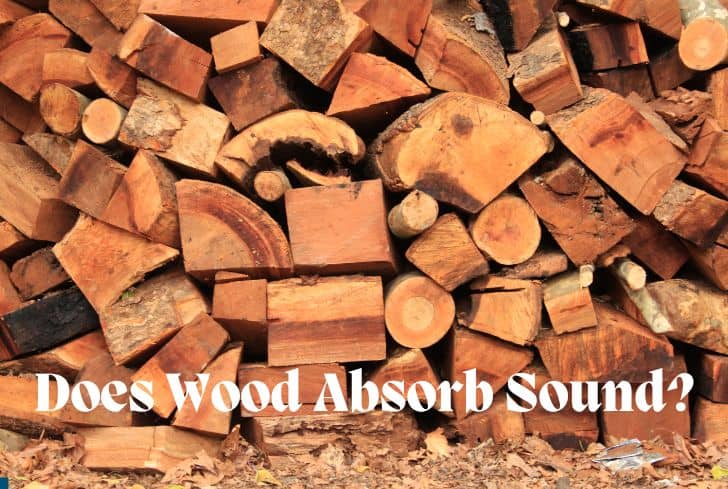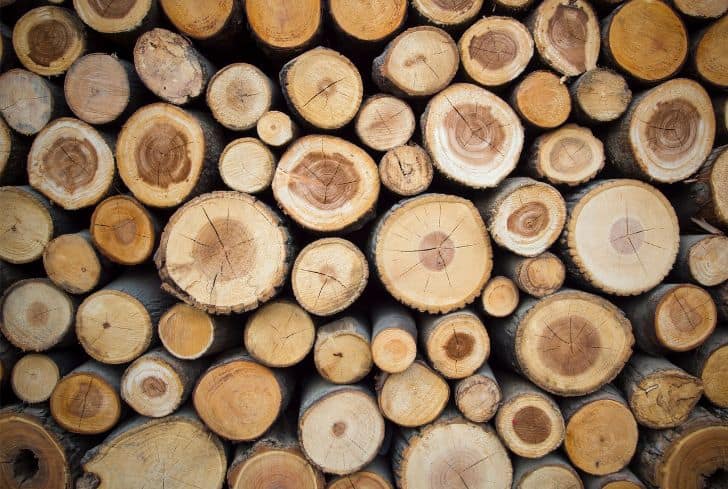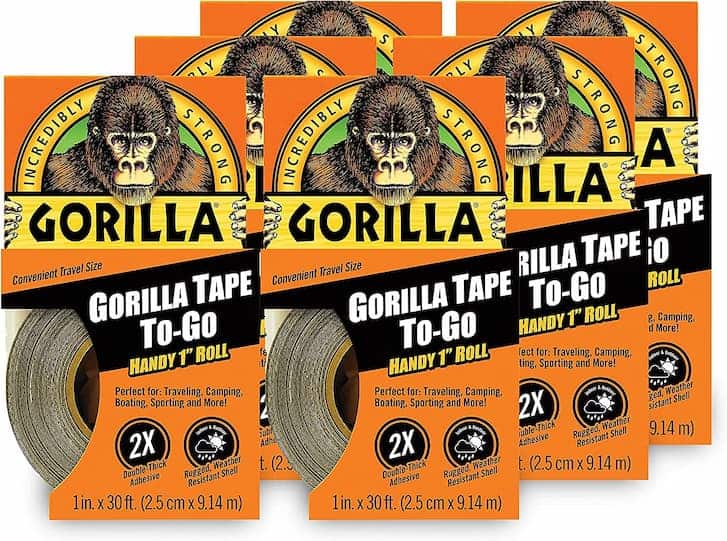Does Wood Absorb or Reflect Sound? (Answered)

When constructing your own house, you might want to have a spot in it where you can relax and have some peace. For this, you have to make sure that the room you choose has good, soundproof walls. If you are one of those people who prefer wooden designs, it may be hard to choose one that absorbs sound.
This might also lead you to wonder whether wood absorbs sound in general – which is a valid question for those who might need to save a little on the monetary side. We have compiled this article to help you understand this phenomenon and whether other materials could be used for soundproofing.
Read on to know more!
Does Wood Absorb or Reflect Sound?
Naturally, wood is better at reflecting than absorbing sound because it is not a dense enough material to effectively absorb sound. However, wood’s porousness increases its capacity to absorb sound. That’s why it has long been drilled with holes, grooves, or slots in order to create a porous resonator that dampens and absorbs sound.
For this reason, wood has long been a preferred material for making acoustic instruments. By directly striking it, wood generates sound and either amplifies it or absorbs the waves. These factors make wood a perfect material for musical instruments as well as other acoustic uses, such as architectural ones.
If you are looking for a material that can reduce reverberation, noise, and echo, and improve the sound quality inside your room, then adding wood to your interior design will be a good option.
Does Wood Paneling Absorb Sound?
A type of wood that can absorb sound is wood paneling, which makes it a popular option for people wishing to soundproof their homes. The amount of noise that passes through walls can be cut in half by using wood paneling. The type and thickness of the material also have an impact on how well the wood can absorb sound.
Although you don’t need a thick covering of wood for it to properly block out sound, the thicker the panel, the better its ability to absorb sound waves.
You can also apply a thin veneer coating as it can help absorb sound better. Consider adding additional acoustic insulation below the paneling before mounting it on top of the drywall if one of your home’s noisy areas is a nursery or playroom for young children.
Veneer coating can also help reduce noise transmission and get the most out of wood paneling’s soundproofing abilities. To stop sound from exiting the panels’ edges, you might also want to think about adding a sealer.
Types Of Wood That Absorb Sound The Most
Making the correct choice is crucial since different types of wood absorb sound in different ways. Let’s talk about five varieties of wood that are renowned for being sound-absorbing.
1. Maple
Maple would be the best wood to choose for sound wave absorption. The tight pores and exceptionally rich grain structure of the hardwood maple offer it remarkable acoustic qualities. Like fiberglass, it is capable of absorbing noise in the lower octaves. However, because of its reduced weight, it requires less wall or ceiling support, which facilitates installation.
2. Cherry Wood
Another great option for dampening sound waves is cherry wood. It is a hardwood with a delicate grain structure and incredibly tiny closed cells. These characteristics give it outstanding acoustic qualities, making it perfect for musical instruments like guitars and violins. You want to avoid any outside noise interference while you transform the vibration of the strings into high-quality sound.
3. Ash
Ash, a hardwood, is another great material for sound absorption. It absorbs low-frequency sounds even better than maple or cherry wood thanks to its comparatively wide pores between its grains and the bonus of having closed pores.
4. Pine
Pine is another kind of wood that is excellent at absorbing sound waves. Pine is a close relative of softwoods, making it considerably less dense than hardwoods. Its long, straight grains and closed pores may nonetheless effectively absorb high frequencies.
5. Redwood
Last but not least, redwood is a type of wood that also has superior acoustic properties. Despite having a highly dense grain structure and numerous open pores, redwood is soft, just like pine. The material has the ability to absorb sound in the mid to high-frequency range, between 250 Hz and 4000 Hz, so it is great for making guitars.

Is Wood Good For Soundproofing?
If you want to completely block sounds from coming in and out of a room, then wood is not a good option. Wood is only good for sound absorption, which means that it can reduce reverberation, echo, and amplification. Slats, cladding, and interior wood finishes can improve a building’s acoustics even further.
Contrary to popular assumption, sound-absorbing materials don’t stop sound from entering or exiting a room. Instead, they absorb it to lessen amplification, reverberation and echo. Sound-absorbing materials are often porous and have lots of air gaps to increase their efficiency.
The major reason you shouldn’t use sound-absorbing materials on their own for blocking sound is that sound can pass across them but with less energy on the other side.
On the contrary, the goal of sound blocking is to keep noise inside space and/or stop it from passing through a structure. Usually, strong, thick, and dense materials—with no air holes at all—are utilized for this purpose.
You need to use both methods in conjunction for total noise isolation. To prevent sound from entering your home through the doors, windows, walls, and other different openings, you need sound-blocking materials. By doing this, you may decrease noise pollution from outside and stop sound from escaping your home.
Is Drywall More Soundproof Than Plywood?
Yes, drywall is more soundproof than plywood. One of the most common building materials for interior walls, drywall, has long been regarded as the best soundproofing medium. However, drywall erected in accordance with construction specifications is typically not constructed to be soundproof, but rather to act as a sound barrier between rooms.
The majority of the time, drywall will be a more effective soundproofing medium than plywood. This is caused by the drywall’s greater mass and the fact that sound moves through wood relatively quickly.
One of the most common methods for installing drywall to effectively soundproof a space is to double the amount of drywall. You can use Green Glue when placing a layer of drywall on top of another layer of drywall. As sound tries to pass between the two layers of drywall, this will serve to muffle it.
While plywood has some soundproofing qualities, they are not as good as drywall. It is a poor soundproofing material when used on its own because sound can easily pass through thin and light wood. As a result, it might be utilized to aid in soundproofing in some situations where louder noises are absent.
It also provides a cost-effective way to assist reduce noise levels. Overall, plywood can be used to reduce noise, but it will not be as effective as drywall at doing so.
Does Glass Absorb Sound?
Glass only muffles sound at its resonance frequency as it does a poor job to absorb sound. The main reason for this is that glass windows are rather thin when compared to the nearby walls. It would be much easier for windows to absorb sound if they were the same thickness as the walls.
Glass only “absorbs” sound at frequencies close to its resonance. Instead of reflecting the sound energy back into the room as it does with most other frequencies, the glass in this situation converts it into vibration energy.
Windows are vital for light, but they can significantly affect a room’s capacity to absorb or reject sound. Because of this, it’s important to think about how you might avoid it while constructing your new house with soundproof areas.
Which is More Soundproof: Glass or Wood?
The answer to this question depends on whether you are looking for sound blocking or sound absorption. Glass will be more effective if you are looking for sound blocking. There will be less noise to travel through because it is thick and dense. Wood, contrarily, is good at sound absorbing. It is porous, which allows sound energy to be absorbed and transformed into heat energy.
Hence, in case you want to enhance a room’s audio quality and absorb background noise, wood is the appropriate material in the situation.
Wood is a better soundproofing material than glass as it is porous. However, because of its large specific mass, glass is a preferable material if you need to muffle the sound. For soundproofing, both glass and wood are effective.
Final Thoughts
The aesthetic of a building can be improved by wood’s inherent qualities, making it a great material for concert halls, offices, conference rooms, schools and lecture halls, etc. We hope that this article has helped you understand how wood can absorb sound and make for a good base for a study room or a library.






